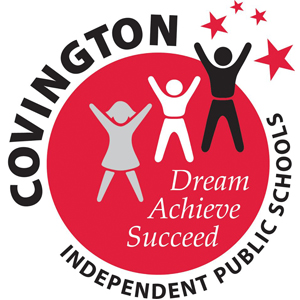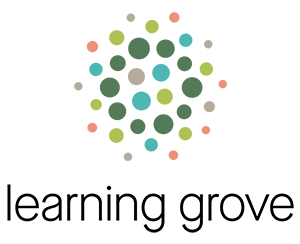By Mark Hansel
NKyTribune managing editor
The Northern Kentucky Education Council (NKYEC) annual fall meeting at Thomas More University’s Steigerwald Hall focused on regional efforts to increase the number of students that are ready for college, career, and life.
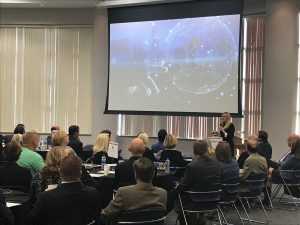
Fort Thomas Independent Schools Superintendent Karen Cheser delivered a call to action to the region’s education community at the NKYEC 2019 Fall Meeting at Thomas More University (photos by Mark Hansel).
Speakers included Joseph L. Chillo, president of Thomas More University, Dr. Randy Boone County Schools Superintendent and NKYEC executive director, Dr. Karen Cheser, Fort Thomas Independent Schools Superintendent, Dr. Ashish Vaidya, president of Northern Kentucky University and Dr. Aaron Thompson, president of the Kentucky Council on Postsecondary Education.
They were joined by a wide range of educators and community stakeholders from across the region.
The session began with a welcome and introductions by Chillo and Dr. Fernando Figueroa, president of Gateway Community and Technical College.
Figueroa said the focus on college and career-readiness has really become a labor of life for the region’s institutions of higher learning and for in education in general. The objective is to work with legislators to create more opportunities for citizens to get into, or back into, the workforce.
“The Northern Kentucky Chamber of Commerce created an initiative that became Grow NKY,” Figueroa said. “It really is the first effort to bring together the full spectrum from preK all the way to hiring policies, practices and job quality indices, to really show how we put it together as a region to develop the ecosystem for this.”
Cheser’s presentation began with a video showing some of the incredible advances in technology that are happening now, or on the horizon. The video brought into focus the challenges facing educators who must prepare students to enter this brave new workforce.
“That’s kind of why we all are here, is to prepare our children, our young adults, our adults in college, for this kind of world,” Cheser said. “That’s going to take all of us in this room putting our best minds together thinking differently, thinking uniquely, working collaboratively, all of the skills that we know that our students have to have to be prepared.”
It is a daunting task, considering that more than half of today’s students will likely compete for jobs that don’t yet exist in today’s workforce.
This video from the Northern Kentucky Education Council 2019 Fall Meeting demonstrates how rapidly technology is changing the world we live in. The purpose was to spark a discussion among the region’s educators about how to best prepare students to enter the workforce in this ever-evolving environment.
It is no longer going to be sufficient to educate students on content, because that is available with the click of a button. The emerging, and the next generation of students are going to be required to take content and apply it in ways they may not even be familiar with today.

Dr. Ashish Vaidya, left, of NKU and Dr. Fernando Figueroa of Gateway Community and Technical College adress those in attendance at the NKYEC Fall Meeting at Thomas More University.
“My job today is to give a view of the current status of some of the things that we are doing regionally,” Cheser said. “More importantly, it’s a call to action, to think about where you fit in to this puzzle and which team you want to be part of.”
Fort Thomas schools have developed a “portrait of a graduate” and several school districts in the region and nationally have embraced a similar theme. The next step is to create a plan to provide students with the skills to get there.
“The first place that starts is deciding as communities and a region, what are those skills, what do we want our students to know do and be like? This where we come in with the Growing Regional Outcomes through Workforce (Grow NKY) initiative,” Cheser said.
A college and career readiness coalition of the NKYEC and a team focused on business engagement came together and joined forces.
“Nobody has time to duplicate efforts and now we are a part of Grow NKY,” Cheser said. “Our goal is to align efforts to build momentum, to find where there are gaps and to go after that work collaboratively to move the needle, both for our students and economically.”
One of the first tasks was to look at the landscape and develop a career readiness report.
Some of the findings included that of roughly 19,000 high school students in the region each year, 68 percent are termed college- or career-ready, based on state measures. Last year 195 were in some sort of internship and just 15 had apprenticeships.
“We think we can move that number,” Cheser said. “We also know that we have fewer than 50 percent in any district here, of students who are graduating from college.”
When college students fail to earn a degree, they assume college debt, without the skills or credentials to secure a job with a living wage. Cheser said that is a trend that has to end.

Educators and stakeholders from across the region came together at Thomas More University to discuss ways to improve work-readiness through education at the NKYEC Fall Meeting.
“If we are serious about ending poverty in our region and about bringing people to live her for our jobs and fueling the workforce, we’ve got to make sure our students are successful,” Cheser said.
Vaidya, who came to NKU just 15 months ago, said he was drawn here because of the university’s reputation as a leader in regional engagement.
“Northern Kentucky University is an anchor institution, it is a steward of place, and that really spoke to me,” Vaidya said. “We are here to drive regional economic prosperity with our partners and that was a very important element of why I am here.”
NKU recently celebrated its 50th anniversary and has just over 70,000 alumni.
“But 82 percent of our alums are in this region,” Vaidya said. “That gives you a great sense of how much our graduates add to the economic, social and civic vitality of this region.”
Vaidya was almost immediately tasked with shaping the vision of NKU, going forward, which he found very exciting. He determined that identifying a long list of priorities could be divisive and difficult, if not impossible, to achieve.
“Given what I knew already about, not only what was happening at Northern Kentucky University, but around the nation, (I believed) that we really should focus on just one priority,“ Vaidya said. “That is advancing student success, aligned with the needs of the region. With that effort, we started this process.”
Instead of a plan set in stone, Vaidya identified a framework, which would allow for the flexibility to constantly change and iterate as the landscape changes.
“If institutions don’t respond quickly enough, we’re going to become obsolete,” Vaidya said. “It’s a three -year framework and we’re going to keep changing that. We end up with three main pillars, from access, completion and career and community engagement.”
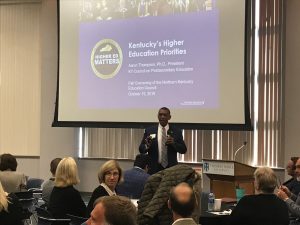
Council on Postsecondary Education President Aaron Thompson spoke to more than 2,000 stakeholders across Kentucky to find out what it will take to develop a workforce that is compatible with the needs of employers in the Commonwealth. He shared his findings at the NKYEC Fall Meeting at Thomas More University.
Figueroa said the growing conversations now is whether employers are employee ready.
Traditionally, a large number of students entering the workforce fit a certain youthful profile, but that’s not the case anymore.
As technology evolves, more and more people are entering or re-entering technical schools, colleges and universities, to develop the skills needed to compete for available jobs that will support their families.
“Employers are looking at social workers to help with financial literacy, family and legal issues,“ Figueroa said. “This is a grand adventure that we are on and frankly it’s daunting, but one of the things I’d like, especially you policy makers here in the room to understand, is that we are not just about lofty goals and we’re not just about complaining. We are about putting together real solutions, tactical resolutions and how we can work together as a region, as one NKY.”
The Kentucky Council on Postsecondary Education is the coordinating body over higher education for the state of Kentucky.
Thompson said in order to be effective in that role, he felt he needed input from stakeholders across the state.
“When I started this job, what I wanted to do more than anything else was to listen to what people had to tell us,” Thompson said.
He embarked on 10 listening tours and got feedback from 2,000 community members, business and industry people, parents and families with “skin in the game.”
“We heard that they are concerned about the cost of college, about not being ready for college, that they didn’t know the value of college,” Thompson said.
It’s why he said the conversations coordinated by organizations such as NKYEC are so critical.
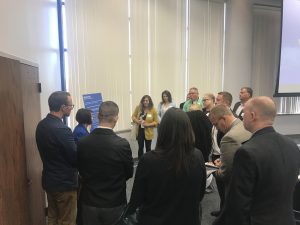
At the conclusion of presentations at the NKYEC Fall Meeting, educators and stakeholders broke into groups to begin brainstorming ideas to help achieve the four objectives identified to move the region’s workforce forward.
“What I know is that what is happening in Northern Kentucky is powerful, but we still have a long way to go,“ Thompson said. “Higher education only matters if we are cutting edge – if we focus on exactly how we think about higher ed truly as a pipeline to a longer-term educational attainment process. If you think about it as the key to great economic development and great workforce development.”
His goal for Kentucky is for all of its citizens to have at least a post-secondary credential that matters by 2030.
“Sixty percent of those folk need to actually be ready to go into the workforce or to be ready to move forward into the next level of their lives,” Thompson said. “We’re about 45.5 percent now, which means we are going to have to add about 360,000 new people to this list.”
Thompson acknowledged that it is a monumental goal, but one he believes is attainable.
“To do this, it’s going to take really, a concerted effort from all of our partners,” Thompson said. “People have heard me say this before, if you want to create a strong application system – create a strong early-childhood system. If we have kids that can’t read by grade three, then we are losing the battle.”
The NKYEC has identified four objectives that will put the region on the road to achieving those goals and called on those in attendance and throughout its communities to identify which they want to help achieve.
They include:
Objective 1) Awareness of High-Need Industry Paths:
*Schools and businesses work in collaboration to explain- and expose students (and families) to- BIG 5 high need employment sectors
*Increase awareness of High-Demand Industry Paths by 50 percent by the end of 2021
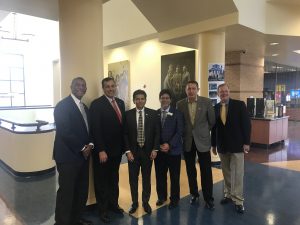
Education leaders from across the region joined Council on Postsecondary Education President Aaron Thompson at the NKYEC Fall Meeting at Thomas More University. L to R, Thompson, TMU President Joseph Chillo, NKU President Ashish Vaidya, Gateway CTC President Fernando Figueroa, Gene Kirchner of the NKY Chamber and Randy Poe, president of the NKYEC.
Objective 2) Work-Based Learning Experiences:
*Provide a broad base of career-focused experiential learning opportunities through the collaboration of schools and businesses
*Increase Work-based Learning Experiences by 50 percent by the end of 2021
Objective 3) Strength-Finding Help students identify talents and passions
*Through identifying talents and passions, student post-graduation plans will increase by 50 percent by the end of 2021
Objective 4) Access and Success: focus on access and opportunity, post-secondary retention
*Improve post-secondary retention (degrees and/or credentials) by 10 percent by 2026
With such lofty goals, the region’s leaders in higher education say even a total buy-in from the academic community will not be enough.
“I think the challenges we are going to be able to solve, but you need everybody at the table,” Vaidya said. “It’s the best thinking, it’s the best ideas, it’s the collaboration. We all have a responsibility to make these things happen.”
Figueroa said Gateway and the NKYEC have been focused on how to create a strong enough conduit between educateon, training and business.
“What we haven’t yet done is create the hook-ups that will allow for an easy connection between education and training,” he said. “We’re not going to be able to do it with just education and training assets. We need to have the job quality, the job potential and career potential of our region in order to improve social mobility and the desire for, and advantage of, postsecondary credentials.”
Chillo said, at the end of the day, all of those efforts are necessary for the region, and the state, to be successful.
“I think it’s critically important to bring the community together because its essential that we work together to address the issues that we need to meet in order to make sure that Kentucky continues to grow and becomes a destination,” Chillo said. “If we are going to be the center for entrepreneurship and innovation, we need to make sure we have the right talent to advance Kentucky’s agenda.”
That effort began at the conclusion of the meeting as those in attendance broke into groups for initial discussions on how to achieve the four objectives.
Contact Mark Hansel at mark.hansel@nkytrib.com


















